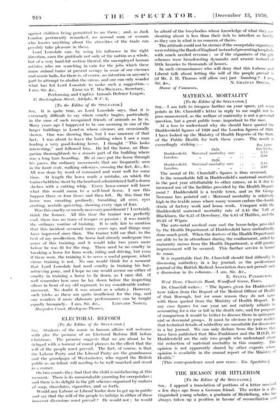[To the Editor of Me SPECTATOR.] SIR, It is quite
true, as Lord Lonsdale says, that it is extremely difficult to say where cruelty begins, particularly in the MSC of such recognized friends of animals as he is. Many years ago I happened to be one morning in one of the larger buildings in Londyn where circuses are occasionally shown. One was showing then, but I was unaware of that fact. I was about to leave the building when I saw a man leading a very good-looking horse. I thought "This looks interesting," and followed 1 ' . He led the horse, an Huns garian thoroughbred, to a remote part of the building where was a loin; bare hoarding. He at once put the horse through Ills patees, the ordinary movements that are frequently seen in the hank erole, walking sideways, crossing the feet, &c., &c. All was done by word of command and went well for some time. At length the horse made a mistake, on which the I ranter held I • short by the head and administered half a dozeri slashes with a cutting whop. Every horse-owner will know what this would mean to a well-bred horse. I saw this happen three or four times and then left. By this time the horse was sweating profusely, trembling all over, eyes start Mg. mist rils quivering, showing every sign of fear.
Was tills cruelty or merely 11C(1,,ary punishment? I certainly tIgnk the former. All this time the trainer was perfectly 1.001, there was no trace of temper or passion ; it was merely 1 he ordinary routine of training. It is only fair to mention that this incident occurred many years ago, and things may have improved since then. The trainer told me that, to the test of my recollection, the horse had already undergone two years of this training, and it would take two years more beffire he wIIN fit for the ring. There need be no cruelty in breaking a horse for farm work, riding and driving, but even it. there were, the training is to serve a useful purpose, which circus training is not. No one would think for a moment 1 bat Lord Lonsdale had used cruelty in training ins hat- retrieving pony, and I hope no one would accuse me either of eruelty in training a horse to lie down, as I once did. (I well remember how once lie lay down before the inspecting officer in front of my old regiment, to my considerable embar- rassment. No doubt it was meant as a salute.) However, sash tricks as these are quite insufficient for the ring, and one wonders if more elaborate performances can be taught
equally humanely.—! am, Sir, &e., Lnox.sito NOBLE.
//orpsden Court, llenley-on-Thames.














































 Previous page
Previous page